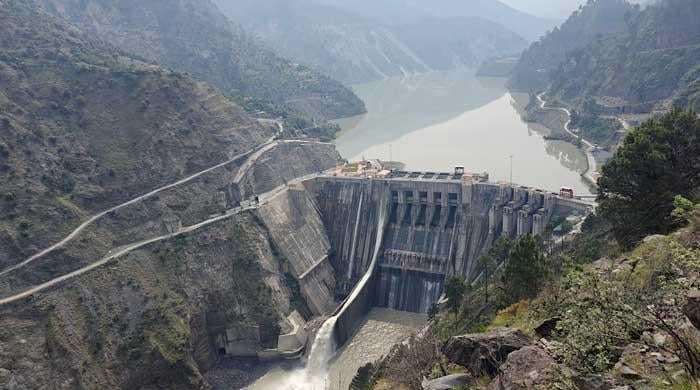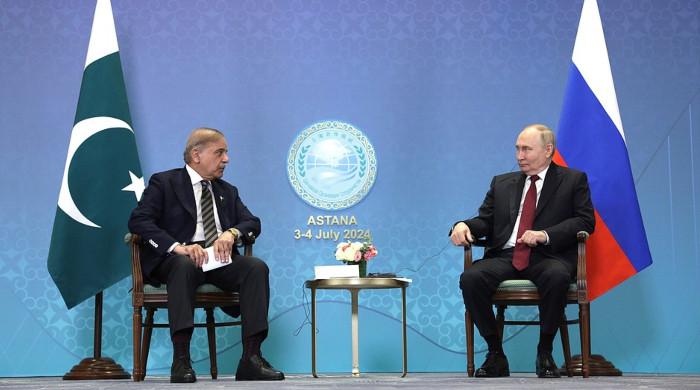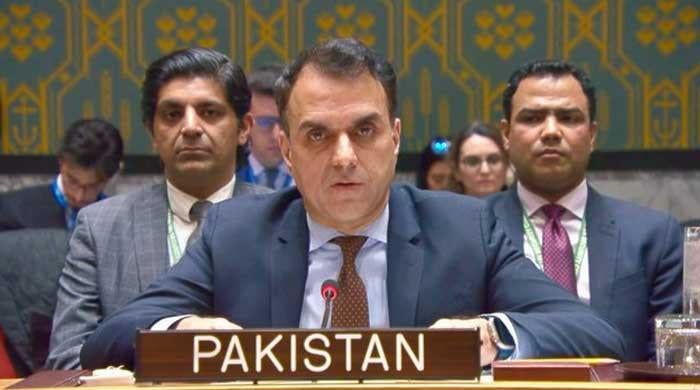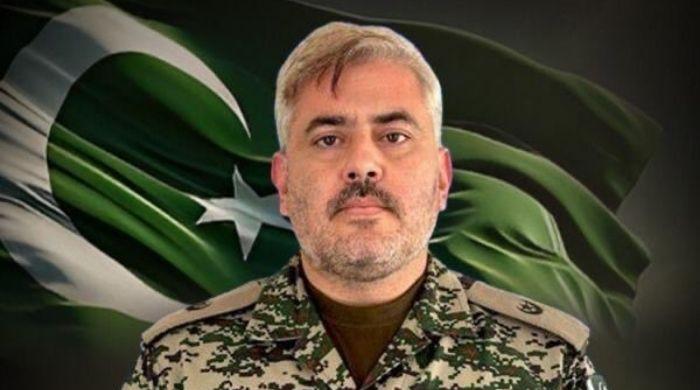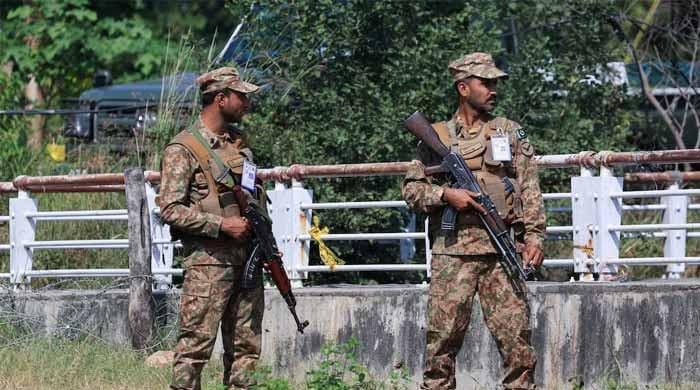Altaf, MQM and Muhajirs
Analyst Mazhar Abbas speaks about the challenges which lay ahead of MQM, Farooq Sattar and Altaf Hussain
August 27, 2016

Altaf Hussain has chosen a dangerous path to tread on. It would lead him nowhere, but perhaps majorly damage his political philosophy of Muhajirism.
Dr Farooq Sattar has a big challenge ahead to keep his distance from the MQM founder and to ensure that the party vote bank remains intact. Can he do it?
Altaf’s aggressive tone has added to problems for MQM in Pakistan, in the long term it could affects its vote bank — if the damage is not repaired soon.
Much depends on the PPP-led Sindh government and the establishment as Sindh's political dynamics are based on ethnicity and the fear factor. Ethnic polarization often kept Sindh’s politics unchanged between the PPP and the MQM for the last three decades.
Action against MQM in the last two days could prove counterproductive as mere demolishing party offices and an unofficial ban on its political activities could lead to a sympathy wave for the party, if not for Altaf Hussain.
The establishment has to be careful in its moves and the Sindh government too in differentiating among alleged MQM militants, MQM workers and the Urdu-speaking community in government departments.
If the government wants to ban the MQM and seek legal action against Altaf Hussain for his anti-Pakistan stance, it should file references, but punishing the whole party may not help as it has historically been proved that such actions can make an accused a victim.
The MQM as a party is under fire and even the newly-elected Karachi mayor Wasim Akhtar may not get easy going. But it is high time for the MQM London to review its politics and the situation where it landed its own people and party leaders in the last few years, particularly after the 2013 general elections which it won, but, within few days after the victory, an unpleasant situation led to another internal rift that resulted in the formation of the Pak Sarzameen Party (PSP).
However, if one really wants to assess the MQM, Altaf Hussain and their politics, he has to look into the Muhajir factor which gave birth to the MQM. Why the MQM and Altaf Hussain could not secure the rights of their community, i.e. Muhajirs despite remaining in the government for many years is something they need to answer.
What happened after Altaf’s Monday speech followed by his back-to-back speeches in the US and South Africa is only making the political space for his party limited. Now, whether he himself or the MQM London wants ban on the party could be one possibility or it can lead to another split and launch of a new style of the MQM, Pakistan.
Following Altaf Hussain’s speech, many MQM leaders and workers have been arrested, his posters removed and offices either sealed or demolished and the MQM is left with no other choice but to operate from a makeshift arrangement in a private hall at PIB Colony. In the last three years, at least 6,000 MQM workers have been arrested on different charges. Half of its legislators are facing criminal charges and most of their sector and unit chiefs are in jail. The MQM Pakistan can launch a political movement, but not with an 'anti-Pakistan' tag that it earned due to Altaf Hussain's speeches, remarks and slogans.
Yes, Altaf Hussain is frustrated because for the last two years, he is banned on the Pakistani media due to a Lahore High Court verdict and after his latest speech the party may not even stand a chance in the Supreme Court of Pakistan. It is also true that he is facing some very serious cases and inquiries about money laundering and Dr Imran Farooq's murder.
In the next couple of weeks, the British government may also take a position after his last speech which led to an attack on media houses and could fall into the category of inciting violence. He has the right to protest such cases and term them political victimization, but that does not mean you start accusing the state or your own country which has given you so much pride.
Altaf needs to assess his own achievements in this very country. Coming from a lower middle class family, he became the most powerful leader of urban Sindh. No other leader after Zulfikar Ali Bhutto had ruled the minds of his people as Altaf Hussain did. His party even today is the fourth largest party of Pakistan, second largest in Sindh and still the biggest in Karachi and Hyderabad. Today, the MQM has 25 MNAs, six senators, 45 MPAs, mayors in Karachi and Hyderabad and chairman and vice-chairmen in three districts of Karachi. Till recently, it remained the most organised political force.
He himself had opted for political exile when the late chief minister, Jam Sadiq Ali, tipped him about an oncoming army operation and advised him to leave Pakistan. Later, after few years, he got the British nationality. It was perhaps his and his party's political mistake. It not only added to financial difficulties for the party but also divided the organisational structure between the MQM Pakistan, and the MQM London with two Rabita Committees. It got the best chance of winding up London offices during the long tenure of former army chief General Pervez Musharraf who had even advised him to return home.
Altaf Hussain’s and the MQM, London, decision to continue their operation from the UK led to a financial burden for the party which later faced serious accusations of money laundering, extortion and, with the passage of time, saw the unusual life style of some MQM leaders in Pakistan.
It also increased burden on the party as the top party leadership used to visit London. Thus, the increased overseas activities changed its leadership's lifestyle and many party leaders opted for dual nationality after Altaf Hussain became the British national. Had Altaf Hussain returned to Pakistan after few years or even under Musharraf's era and run the party from his own political Markaz 90, Azizabad, he might not have faced the situation he is facing today.
With the passage of time, the MQM lost the credentials of being a party of the middle class. It became difficult even for the party workers to believe that it is merely being run on donations. This gave a bad name to the party and despite its leaders tried to defend its presence in London, they agreed in private conversations that things had got out of control.
Why a leader with such a popular base and huge following looked for forces outside Pakistan. No nationalist or ethnic party enjoyed such a massive backing from its constituents as the MQM got from Muhajirs.
Altaf Hussain could have got more political support within the country at a time when the PPP was completely down and confined to interior Sindh and the Pakistan Tehreek-e-Insaf was facing a serious organisational crisis which if not resolved could lead it to yet another defeat for it in the next general elections. Thus, under the given circumstances, the MQM has the best chance to improve its position provided better sense prevails in London and for this, the MQM leader must stop what he has been saying, particularly against the country.
Altaf had emerged on the political horizon in Pakistan in 1978 as a student leader and was convicted a year later for allegedly burning a Pakistani flag, the charge he had denied. Later, he converted his student party, All Pakistan Muhajir Student Organisation, APMSO, into Muhajir Qaumi Movement in 1984.
Many believe that Altaf was a product of late military dictator General Ziaul Haq and was 'used' by his successor General Aslam Baig against the PPP. Altaf went into exile after General Asif Nawaz launched an army operation in 1992 and was reconciled by General Pervez Musharraf. This is a brief outcome of how the establishment used him and his party for its own interests.
Except for the present army chief, General Raheel Sharif, all others and the establishment either used the MQM or tried to crush it by creating splits in it as a lot of politics was behind this 'divide'. On the contrary, the political leadership initially adopted a political approach and started with Altaf's patch-up with Sindhi separatist leader, the late GM Syed, but the Jeay Sindh-MQM alliance could not last long.
Later, Altaf and MQM relations with the PPP and the PML-N could also not last, but it got the best chance under Musharraf. Those five or six years, without any doubt, were the best and Musharraf had even given them the 'administrative control' of urban Sindh. Perhaps, Altaf and the MQM may never get a chance or power as they got between 2001 and 2007. Musharraf reconciled with Altaf despite his controversial speech in India.
The MQM and Muhajirs’ natural allies are Sindhis and the PPP. Therefore, it is still time for the two to sign the "Charter of Sindh" and accept each other's political and economic rights. It’s time that both must come out from the 'fear factor' which has created rural and urban divide. It’s time for Altaf Hussain to listen to the man who supported him most, i.e. Pervez Musharraf who, in a recent interview, advised him to quit politics. He has a choice either to be remembered as the father of "Muhajir identity" founder of MQM or an alleged 'traitor'.
—The writer is a senior columnist and analyst of the GEO News, The News and daily Jang.
—Originally published in The News




